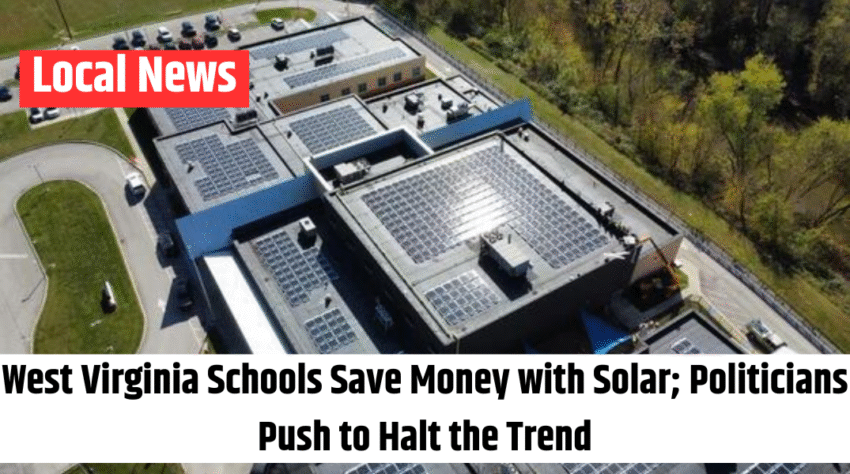As state funding for schools in West Virginia continues to decline, Wayne County Public Schools Superintendent Todd Alexander is constantly exploring cost-saving strategies. One of the most promising solutions he discovered was the opportunity to power the district’s schools with solar panels—at no upfront cost—saving millions on electricity bills over the long term.
Through this innovative approach, Wayne County schools are projected to save nearly $6.5 million over the next 25 years. However, a bill introduced by State Senator Craig Hart during the 2025 legislative session could prevent other schools and government entities from pursuing similar solar energy deals.
Senator Hart, who represents a portion of Wayne County, argued that schools should not be entering into long-term contracts for green energy when it may not benefit them financially. “If a school district is not getting a better deal, I don’t understand why they should be locked into a power purchase agreement,” Hart said during a March meeting of the Senate Energy Committee. He also expressed concerns that schools using solar energy could send a political message contrary to the state’s coal and natural gas industries. “We’re fighting ourselves if we allow green energy solutions in West Virginia schools,” added Senator Scott Fuller, who also supported the legislation.
Wayne County schools’ agreement with Solar Holler, a local solar provider, is a type of contract known as a power purchase agreement (PPA). Under this arrangement, Solar Holler covers the costs of installing the solar panels, while the school district benefits from lower electricity bills in exchange for using the solar energy generated.
The proposed bill by Senator Hart seeks to limit such agreements for all public entities—including schools—to a maximum of five years, with the possibility of renewal. However, PPAs typically span between six and 25 years. The shorter contract length proposed by Hart would make it financially unfeasible for developers, as they would struggle to recoup their investment within such a short time frame, said Heather Ransom, marketing director for Solar Holler.
Also Read – W.Va. Squatting Bill Draws Fire From Advocates Over Homelessness Concerns
Ransom explained that the upfront costs of installing solar panels are significant, and a five-year contract would not give developers enough time to recover their investment. “These long-term contracts allow us to offer schools an opportunity to go solar without any initial cost, which is crucial for districts facing financial challenges,” she said.
Senator Hart expressed concerns that schools could find themselves on the losing end of long-term agreements due to the unpredictable nature of future electricity rates. He highlighted that the rates agreed upon in these contracts are fixed and often guarantee savings for schools. In Wayne County, for example, the school district is assured of at least a 3% annual savings on its power bills, with an option to exit the contract if savings goals are not met.
Despite these safeguards, some lawmakers remain cautious. Senator Ben Queen, who represents Harrison County, voiced his concerns over the financial impact on schools in his district. Calhoun County Schools, which was the first district in the state to sign a similar agreement, is projected to save over $700,000 over the course of its 25-year deal with Secure Solar Futures. Queen pointed out that, while $740,000 may seem modest over 25 years, it’s a significant sum for a rural district.
While Hart’s bill moved out of the Senate Energy Committee for consideration, it was later stalled in the Senate Rules Committee as the legislative session came to a close. Hart has since indicated he might amend the bill in the future to focus solely on school districts, rather than all public entities, in an effort to strike a balance between fiscal conservatism and promoting long-term savings for schools.
Wayne County’s Superintendent Alexander is concerned about the potential loss of solar energy opportunities for schools in West Virginia. With declining enrollment and state funding cuts expected to continue, he is actively seeking every possible way to save money without sacrificing educational quality.
“We are always looking for innovative solutions,” Alexander said. “Solar power has been a game-changer for us, and it’s unfortunate that some politicians want to prevent schools from accessing this potential.”
As debates around the future of green energy in West Virginia schools continue, the outcome will have far-reaching implications for how schools across the state can manage their budgets while preparing for a future with increasing energy costs.
This article was originally published by Mountain State Spotlight, West Virginia’s civic newsroom.
